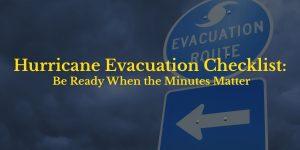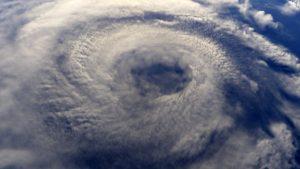
When hurricane season approaches, ensuring your family’s safety is most important. While stocking up on supplies and securing your home are critical steps, legal preparedness is just as important. Protecting yourself and your family before, during, and after a hurricane requires a proactive approach to safeguard your legal rights and interests.
Here’s how you can legally prepare for a hurricane:
1. Review and Update Your Insurance Policies
Before a Hurricane
First, review your homeowners’, renters’, and auto insurance policies. Ensure that your coverage is adequate for the potential damage a hurricane could cause. Standard homeowner’s insurance may not cover flooding, so consider adding flood insurance if you live in a flood-prone area. Take note of any deductibles, the amount you, as the policyholder, must pay out of pocket before your insurance kicks in. Many standard homeowners’ insurance policies generally have deductibles for common incidents like fire or theft. However, when it comes to hurricanes, insurance companies often implement a separate, higher deductible specifically for hurricane-related damages.
During a Hurricane
Before a hurricane strikes, it’s essential to organize your insurance documents and keep them in a waterproof container that is easily accessible. This should include policy numbers, the contact information of your insurance agent, and a detailed inventory of your home’s contents. These documents are crucial for filing hurricane claims and ensuring that you have quick access to the information you need during and after the storm.
If an evacuation order is issued, taking these documents with you is critical. In the chaos of an evacuation, it’s easy to overlook paperwork, but having these documents on hand will better prepare you to handle the aftermath of a hurricane.
After a Hurricane
Promptly report any damage to your insurance company. Notifying your insurance company of damage as soon as possible will help initiate the claims process quickly, which is crucial because insurance companies often experience a high volume of claims following a natural disaster.
Before you start any cleanup or repairs, thoroughly document all the damage to your property, including structural or vehicle damage, flooding and water damage, and damage to personal belongings like furniture. Take both photos and videos to capture the extent of the damage, including close-up shots of specific damage and wide-angle views to capture the overall impact. Images and videos of the damage will help support your claim and provide a clear record of loss to ensure you receive the maximum compensation.
For a free legal consultation, call 800-537-8185
2. Secure Important Legal Documents
Before a Hurricane
Gather all critical legal documents, including birth certificates, social security cards, property deeds, wills, insurance policies, and any paperwork related to your children, such as custody agreements, immunization records, and school documents. If you have pets, remember to bring veterinary records, proof of ownership, and any necessary medication.
These documents are essential for proving your identity, property ownership, and eligibility for insurance claims and government assistance after a natural disaster. With them, you could avoid significant delays or complications when accessing funds, filing claims, caring for your children and pets, or restoring your legal rights.
Store these documents in a waterproof, fireproof safe, or an offsite safety deposit box to protect them from water and other hazards. For added protection, consider creating digital copies stored securely online.
During a Hurricane
If evacuation becomes necessary, take these documents with you. Having them on hand can prevent unnecessary delays in accessing financial resources or filing insurance claims. If your insurance policies and related documents are destroyed or lost, you may struggle to provide the necessary evidence to support your claims. By securing them in a safe location and having digital backups, you safeguard your ability to quickly and effectively respond to any legal or financial challenges that arise after a disaster.
After a Hurricane
Carefully inspect your important legal documents to ensure they are intact and undamaged. If you discover any missing, waterlogged, or otherwise compromised documents, it’s essential to act quickly to obtain replacements. Refraining from replacing these documents can create obstacles when you need to prove property ownership, establish your identity, or demonstrate eligibility for disaster relief or insurance claims. Taking swift action will help you avoid unnecessary complications and ensure you have the necessary paperwork to support your recovery efforts.
3. Prepare a Hurricane-Specific Estate Plan
Before a Hurricane
Reviewing or establishing an estate plan that includes a will, power of attorney, and healthcare directives is crucial to hurricane preparedness. These documents clearly outline your wishes and are legally binding to ensure that your assets are protected by someone you trust who can make decisions on your behalf if you become incapacitated or pass away.
It’s equally important to ensure that the person you designate for these roles is aware of their responsibilities and has access to the necessary documents. Clear communication with your chosen representative helps prevent confusion and ensures your estate plan can be executed when needed.
During a Hurricane
Keep a copy of your estate plan in an easily accessible and secure location. Inform your executor or power of attorney of your whereabouts, especially if you must evacuate during a hurricane or other natural disaster. Regularly update them on any changes to your plans or the estate plan itself so they are fully prepared to act according to your latest wishes and circumstances.
After a Hurricane
Check your estate plan to determine if it requires updating due to changes in your circumstances or assets. This might include updating your will if there was significant property damage to reflect the current value and condition. Additionally, suppose you’veacquired new assets or experienced changes in family circumstances, such as births or deaths. In that case, updating your estate plan will help ensure that it remains aligned with your current wishes and legal requirements. Regular reviews and updates of your estate plan will help avoid potential disputes and ensure that your assets are distributed according to your intentions.
Click to contact our personal injury lawyers today
4. Know Your Legal Rights During Evacuations
Before a Hurricane
Familiarize yourself with the local and state laws regarding mandatory evacuations. Being well-informed about your rights and responsibilities can help you navigate the challenges of evacuation and recovery more effectively. Regularly review local and state regulations and stay updated on any changes or additional protections that may be implemented during an emergency, such as eviction protections and disaster assistance and relief.
During a Hurricane
If you’re required to evacuate, following the orders issued by local authorities to ensure your safety is crucial. Failing to comply can place you in immediate danger and lead to legal consequences, like fines or penalties. By adhering to the directives of local authorities, you help protect yourself and emergency responders.
After a Hurricane
If you experienced an illegal eviction or were a victim of price gouging during the hurricane, consider seeking legal advice to protect your rights. Document all relevant incidents meticulously, with dates, times, and any evidence, such as receipts or communication. A detailed account will help substantiate your claims if you pursue legal action. Consulting with a legal professional can guide you through the process and help you understand your options.
5. Understand FEMA and Other Aid Eligibility
Before a Hurricane
Research the types of aid available through FEMA (Federal Emergency Management Agency) and other disaster relief organizations. Knowing what form of aid is available, such as temporary housing assistance, repair grants, and low-interest loans for damaged property, can help you better understand what types of assistance you might be eligible for based on your specific needs and circumstances.
During a Hurricane
Keep a list of potential resources and contacts for disaster relief, including FEMA, local disaster relief organizations, community support services, and any other agencies that provide emergency assistance. Ensure that all necessary documents, including proof of identity, insurance, and damage, are prepared and organized for a faster application process.
After a Hurricane
Apply for aid as soon as possible. FEMA has strict deadlines; the sooner you apply, the faster you can receive assistance. Be prepared to provide detailed documentation of your losses, including photos and descriptions of the damage and any insurance claims you’ve filed. Keep copies of all submitted documents and correspondence for your records and follow up regularly to ensure your application progresses.
Legal preparedness is a critical component of hurricane readiness. By reviewing your insurance policies, securing important documents, establishing an estate plan, and understanding your legal rights during evacuations, you can protect yourself and your family from the legal drawbacks that often accompany natural disasters.
Hurricanes can be unpredictable, but your legal protection doesn’t have to be. Take these steps now to ensure that you and your family are fully prepared, no matter what the storm brings.
Questions?Call 800-537-8185
to find a Morris Bart office near you.




